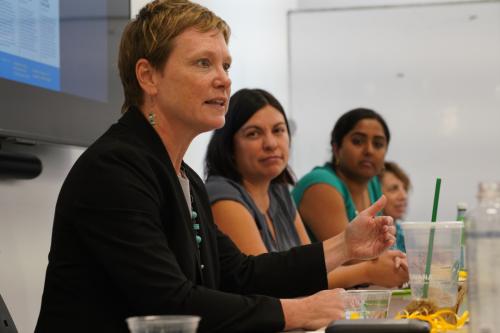MA in Women's Gender and Sexuality Studies
In the pioneering Women's, Gender, and Sexuality Studies (WGSS) Master of Arts degree program, students create an individualized program of study that combines course work with opportunities for practical experience at top agencies and organizations in the nation's capital. Graduates gain the professional skills needed to become competitive participants in the realm of public policy, nonprofit leadership, business, law and more.
Students are expected to develop intellectual depth and a degree of expertise through a four-course concentration in either a specific discipline or a topical area. Examples of specific disciplines include anthropology, sociology, English, history and philosophy, among others. Examples of topical areas include women and health, international development, race and gender and LGBT sexuality.
Women's, Gender, and Sexuality Studies Info Session: March 3
Join us online for an information session discussing the field of women's, gender, and sexuality studies and the GW Women's, Gender, and Sexuality Studies program.
"My graduate degree was critical in further developing a feminist lens and approach. ... I now have a deeper understanding of my work advocating for social justice."
Chitra Panjabi
MA '10
Thesis versus Practicum
As part of the master’s program, each student chooses to write a thesis or complete one of the practicum options. Although it is possible to complete both a thesis and a practicum, most students choose one or the other.
Choosing an MA Degree
Career Paths for Graduates
Find out where a WGSS degree can take you.
Graduate Study Guide
Learn more about deadlines and tuition, scholarships and theses and exam guidelines.
Choosing Program Options
Find out whether the WGSS or WGSS-Public Policy program is a better fit for interests.
Course Requirements
The following requirements must be fulfilled:
The general requirements stated under Columbian College of Arts and Sciences, Graduate Regulations.
36 credits, including 12 credits in core courses, 3 credits in practicum or thesis research, and 21 credits in elective courses.
| Code | Title | Credits |
|---|---|---|
| Required | ||
| WGSS 6220 | Fundamentals of Feminist Theory | |
| WGSS 6221 | Research Issues in Women’s, Gender, and Sexuality Studies | |
| WGSS 6225 | Contemporary Feminist Theory | |
| or WGSS 6230 | Global Feminisms | |
| WGSS 6299 | Capstone Research Seminar | |
| Practicum or thesis | ||
| 3 credits taken in one of the following courses: | ||
| WGSS 6283 | Practicum in Women's, Gender and Sexuality Studies | |
| WGSS 6999 | Thesis Research | |
| Electives | ||
| With the advisor’s approval, students develop a four-course (12 credit) concentration. In addition, they take three elective courses (9 credits) that may or may not be related to their chosen concentration. | ||







